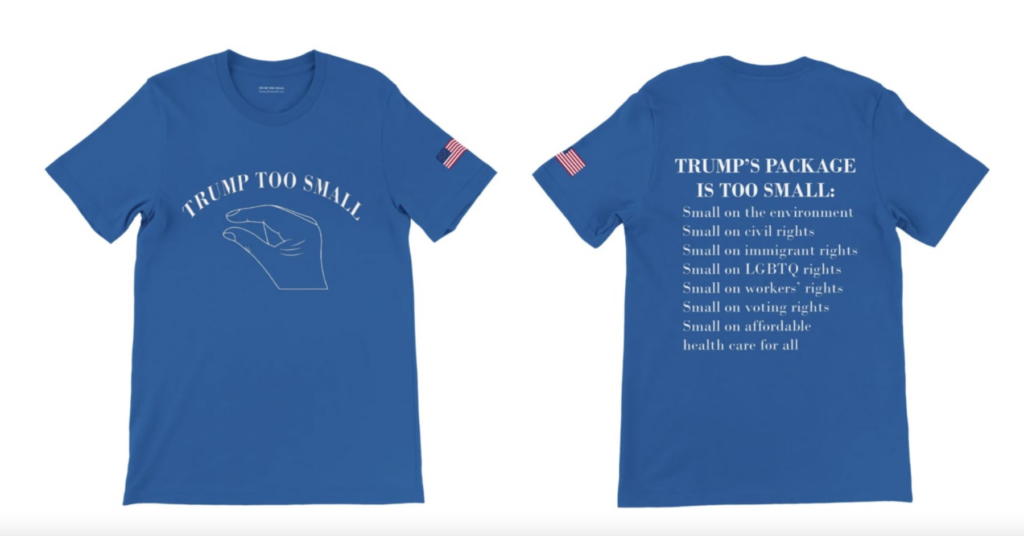United States Supreme Court unanimously finds that trademarks identifying living individuals without consent are not registrable with the USPTO under the Lanham Act
On Thursday, June 13, 2024, the United States Supreme Court considered a petition from a purported trademark owner seeking to register the mark TRUMP TOO SMALL. The owner’s prior attempts to obtain a registration from the United States Patent and Trademark Office (USPTO) were rejected on grounds that the Lanham Act precludes registration of any mark that identifies “a particular living individual” without that individual’s express consent.[1]
 A few immediate takeaways from this dilemma: (1) no one disputes that this proposed trademark registration was a reference to former president Donald Trump; (2) no one is surprised that Donald Trump declined to provide consent to the registration of this mark; and (3) this is one of the easier cases the Supreme Court has considered in recent years.
A few immediate takeaways from this dilemma: (1) no one disputes that this proposed trademark registration was a reference to former president Donald Trump; (2) no one is surprised that Donald Trump declined to provide consent to the registration of this mark; and (3) this is one of the easier cases the Supreme Court has considered in recent years.
The case, Vidal v. Elster, No. 22-704,[2] officially presented the issue of whether the Lanham Act’s prohibitions against the use of Trump’s name in a trademark registration was a “viewpoint-based regulation” in violation of the applicant’s First Amendment rights. The Court unanimously determined that it is not a First Amendment violation because the restrictions are solely content-neutral, and this provision of the Lanham Act did not implicate any free speech rights. The applicant’s request to register TRUMP TOO SMALL was refused and the USPTO is not required to register marks that conflict with this provision in the Lanham Act.
Given the Court’s holdings, this leads to the underlying question: after this ruling, can the applicant still sell merchandise using the mark TRUMP TOO SMALL without an official trademark registration? The answer is unequivocally “yes.” The reason why is somewhat nuanced but also quite straightforward:
“trademarks” and “trademark registrations” are different things.
To clear up any remaining confusion, the Supreme Court did not find that the mark TRUMP TOO SMALL cannot be a trademark. The Supreme Court did not find that the applicant, Steve Elster, cannot sell his TRUMP TOO SMALL-branded t-shirts or related merchandise. Lastly, the Supreme Court did not find that the USPTO could not “trademark the phrase,” contrary to the statements of many, many news media outlets reporting on this case.[3] The only process for obtaining a trademark is to use it in commerce. There are no formalities.
The USPTO does not issue trademarks. The USPTO does not cancel trademarks either. The USPTO, however, can issue or cancel trademark registrations, which are separate property rights which provide certain benefits and presumptions above and beyond the ownership of a non-registered (common law) trademark right. You do not have to register your trademark for it to be a trademark. You can even sue to protect a trademark without first registering it.[4] That said, as a practicing trademark attorney, I highly advise anyone who claims trademark rights in a name, slogan, logo, or stylized design, to protect these rights through a registration with the USPTO. There are numerous additional benefits that registration confers to a trademark owner. Such benefits include:
- Exclusive nationwide rights to that mark;
- Presumptions of validity in court;
- The right to have the trademark deemed incontestable after five years of use;
- The right to receive additional damages from willful infringement;
- The right to prevent counterfeit uses; and
- Additional international rights and recognitions
As it relates to Mr. Elster, he can continue to market and sell his t-shirts. He will probably never receive Donald Trump’s permission, which merely precludes Elster from registering his claimed trademark and being able to affix the ® to the phrase on his products. However, the Supreme Court made no determinations of whether TRUMP TOO SMALL is a trademark or whether it can function as a trademark. That was not the issue before the Court to consider. The only issue was whether the “names clause” was sufficiently content-neutral to otherwise restrict an applicant’s First Amendment right to comment on or even criticize a living person while also obtaining a trademark registration.
The Supreme Court, in an admittedly “narrow” decision, got it right.
*** for anyone seeking advice regarding trademarks, trademark registrations, or related intellectual property rights, please feel free to contact David Clark at dclark@mccathernlaw.com or any other McCathern attorneys ***
[1] See generally 15 U.S.C. § 1052(c) (“No trademark by which the goods of the applicant may be distinguished from the goods of others shall be refused registration on the principal register on account of its nature unless it—… [c]onsists of or comprises a name, portrait, or signature identifying a particular living individual except by his written consent, or the name, signature, or portrait of a deceased President of the United States during the life of his widow, if any, except by the written consent of the widow.”)
[2] 602 U.S. __, 2024 WL 2964139 (June 13, 2024).
[3] This is why many trademark practitioners, including myself, contend that “trademark” is not a verb and should never be used as a verb. It is not a process or term reflecting an activity.
[4] The same is not true of copyrights – registration of a copyright is required as a pre-requisite to any lawsuit. See generally Fourth Estate Public Benefit Corp. v. Wall-Street.com, LLC, 586 U.S. 296 (2019); 17 U.S.C. § 412.